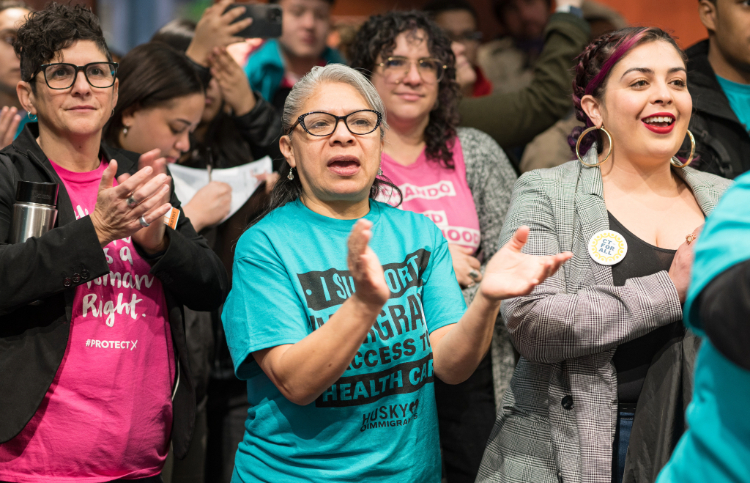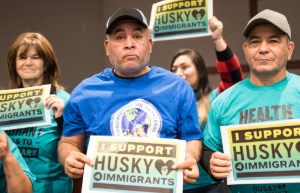
By Rhea Hirshman
Using lemon water and sugar water in efforts to stabilize your blood sugar is not an effective way to manage diabetes.
But if you are barred from access to health insurance, that intervention may be the only one available to you.
In more than 700 written, virtual, and in-person testimonies to the state legislature’s Human Services Committee last winter, individuals told stories like these: of untreated chronic disease, fears for the health of elder family members, concerns about where to turn in medical emergencies, and significant income losses from missing work due to illnesses that they could not afford to have diagnosed or treated. Social services providers, educators, union representatives, faith leaders, members of immigrants’ rights groups — and a significant number of health care professionals and students — spoke about how lack of health care access affects the populations they serve. While less than six percent of Connecticut residents overall are uninsured, 58 percent of the state’s 113,000 undocumented residents lack any coverage.
Barred by federal regulations from obtaining access to health insurance coverage through Medicaid, the Children’s Health Insurance Program (CHIP), or the Affordable Care Act marketplaces, undocumented residents across the U.S. often avoid seeking care until they are critically ill, resulting not only in personal suffering and family catastrophe, but in billions of dollars in uncompensated care costs to hospitals nationwide. And private insurance is either prohibitively expensive or companies reject applications due to lack of social security numbers.

Where Connecticut stands now
As of July 2023, 12 states, including Connecticut, have provided some coverage for undocumented residents, most often for children and pregnant women, with five states also covering income-eligible adults regardless of immigration status.
Efforts in Connecticut to expand coverage to Connecticut’s undocumented residents (primarily through HUSKY, the state’s Medicaid program) have been spearheaded by HUSKY 4 Immigrants, a coalition of nearly two dozen state and local organizations ranging from neighborhood-based immigrants’ rights and social justice groups to statewide organizations focused on health care, health education, and health equity. The coalition provides educational resources in several languages (including Arabic, French Creole, Portuguese, and Spanish) to its member groups, helps local organizations connect constituents with their legislators, and teaches advocacy skills such as writing testimonies.
The Connecticut Health Foundation has supported organizations within the coalition for their policy and advocacy work on expanding coverage since 2019 and, in 2023, awarded a grant to the coalition itself.
Through the coalition’s education and advocacy work, undocumented pregnant women gained access in April of 2022 to coverage through HUSKY, and access to a year of health care coverage postpartum was added in April 2023. Additionally, as of January 2023, undocumented children ages 12 and under gained access to HUSKY coverage through Medicaid and CHIP. In July of 2024, the age limit will rise to 15.
Now, says Luis Luna, manager of the HUSKY 4 Immigrants coalition, it is time for Connecticut to extend HUSKY health coverage to all its eligible residents regardless of immigration status. In his testimony to the Human Services Committee, Luna noted that “Without coverage, individuals often delay seeking care until conditions that could otherwise be easily managed require emergency department visits or hospitalizations. If Connecticut wants healthy families and a stable, thriving, well-prepared workforce, the state must ensure equal coverage access.”

Luis Luna, HUSKY 4 Immigrants
Luna notes the strategic approach the coalition has taken. “In 2019, when our campaign really began,” he says, “it seemed impossible that Connecticut would open Medicaid to our undocumented population. But we’ve built support by centering the idea that health care is a fundamental human right.”
The economic impact of expansion
That support shows in an independently conducted survey commissioned by HUSKY 4 Immigrants in 2022, indicating that a clear majority of Connecticut voters (57 percent to 36 percent) favor allowing all income-eligible state residents to receive insurance through HUSKY, regardless of immigration status. While, according to research by RAND, this expansion would cost the state about $83 million (about three percent of the state’s annual Medicaid budget), Connecticut’s undocumented immigrants pay federal payroll and income taxes and contributed nearly $198 million in Connecticut state and local taxes (2018 figure). Still, they cannot access many of the programs that their tax dollars support.
Expansion also makes economic sense. RAND estimated that expanding coverage to all residents who qualify by income, regardless of Immigration status, would save more than $60 million in uncompensated care in the state. As a HUSKY 4 Immigrants representative pointed out in another legislative hearing, “By expanding HUSKY, we are investing dollars now to save significantly more in the long run.”
Pushing forward
While Luna is hopeful about building on recent successes in providing coverage for younger undocumented residents, he emphasizes that the group’s aim has never been to cover just children and young people. Although those who might support health care access for undocumented children are not always on board with extending it to adults, “We don’t want to perpetuate the narrative that only children deserve health care,” he says. “Even if your main focus is children, you have to understand that the health of adults has a direct effect on the children in their lives.”
The coalition intends to keep pushing forward. “If in every legislative session we get only a two- or three-year expansion,” Luna says, “my 66-year-old father, who has heart problems, would not qualify for coverage until he is close to 90. He and others who need care don’t have that long to wait.”